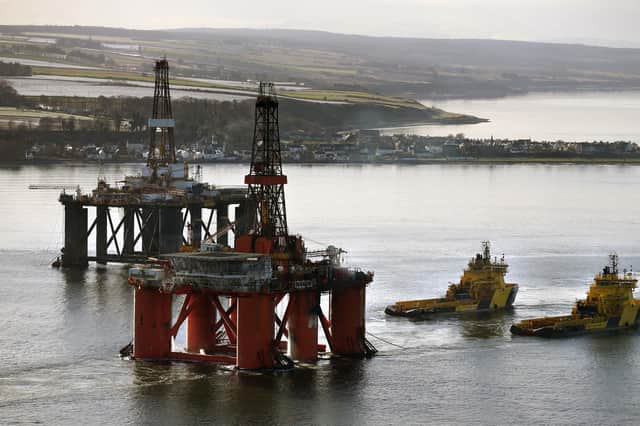We should use GERS to restore the need for value for money and prudence - Brian Monteith


Other than showing the economic impact of factors such as the Covid pandemic or Putin’s invasion of Ukraine on spending and taxes, are the figures and trends used to influence future expenditures or revenues?
The answer is no. Instead, over the decades since its introduction in 1992, the GERS report has settled down to become a predictable piece of political pantomime. Our politicians are in a rut, using GERS to justify their constitutional viewpoint no matter what it says.
Advertisement
Hide AdAdvertisement
Hide AdOriginally the Conservatives thought it would be useful to show how well Scotland benefitted from being a member of the UK, as if we have some sort of federal state. It soon dawned on them it was a double-edged sword, for the GERS figures would often show that when tax revenues from extraction of oil were included Scotland was a net contributor to the UK exchequer.
In such years, and they were a regular occurrence in the nineties and noughties, GERS became a useful tool for nationalists, who would regularly make political capital out of how Scotland might be able to enjoy a sustainable economy – thanks to what GERS said about oil and gas revenues.
While there were a few voices suggesting such tax revenues could not be relied upon for an independent Scotland’s sustainable future, such days of unmanageable deficits seemed far off – yet they were in fact almost upon us. The first factor was falling oil production and much lower oil price were about to drive down tax revenues; but secondly, Scottish public expenditures were continually growing, along with the burgeoning size of the Scottish state.
GERS represents the combination of revenues and spending by both Scottish governments based in Edinburgh and London, and since the turn of the century – essentially since Ken Clarke was Chancellor of the Exchequer – both administrations in Holyrood and Westminster have had an insatiable appetite for higher spending.
Now we have the situation where a structural deficit in Scotland has been allowed to develop and each year all that is under debate is how large it will be – dependent on the price of oil and the consequential tax revenues that it will generate. For nationalists GERS is again a political embarrassment, for it shows the repeatedly huge cost of making stuff free would have to end without the transfer of UK taxes into the Scottish block grant (essentially from the City of London and its south eastern doughnut they loathe).
Yet for those who preach the benefits of the UK as a unitary state that shares out its benefits it also demonstrates how uneven the economic prosperity of the whole country is – for much of the state spending in Scotland goes to alleviate the lower economic growth and poorer standard of living. Were GERS-type reports to be published for the north of England, and even for the midlands and south west similar structural deficits would also be shown, although not the 25 per cent higher public spending per person there is in Scotland. Such regional deficits are the unsaid evidence that justifies the Conservative policy of “levelling up”.
For this year’s GERS figures Scotland’s governments continue to conspire in their own separate ways to deliver a very large “Scottish deficit” of £19 billion, or £28 billion if you leave out tax revenues from oil production. For those contemplating independence it means the Scottish public spending deficit is either 9 per cent or 15 per cent of Scotland’s GDP – an impossible position for any government to start from that would require significant changes to bring down public expenditure and raise taxes – without killing the generation of economic activity in the process.
Given the nationalists now advocate ending oil and gas production sooner rather than later the emphasis would have to be on cutting public expenditures. Austerity would be an inadequately weak description.
Advertisement
Hide AdAdvertisement
Hide AdMy personal approach to Scottish public spending deficits has always been there is nothing to be gained by welcoming them as an example of governments doing good, or justifying the benefits of Scotland remaining in the UK, or making it impossible for Scotland to secede. I would much prefer we should be moving towards restoring surpluses so that a virtuous circle can be obtained where taxes can be reduced to help make the economy more active to maintain surpluses.
A Scotland that occasionally contributes more revenues to the exchequer than the expenditure it consumes (as it has done in the past) should be our aim, as it will mean a healthier Scottish economy and that tax revenues will be going to help somewhere else in greater need (rather than Scotland always being that place). At other times, like now, we would be the beneficiaries. That is how the pooling and sharing of a unitary state should work and that should be our goal.
This brings me back to the purpose of GERS – what should it be for? Surely instead of encouraging pointless grandstanding about continuing deficits we should be using it to inform our political culture about how we can drive down expenditure and maximise revenues.
GERS tells us we desperately need Holyrood to turn a corner and force observance of frugality and prudence. We need more public auditing and greater shaming of overspending officials and politicians – with the latter being surcharged for the ultra vires spending they approve.
We need politicians to start talking about achieving value for money again and to condemn unequivocally those who waste taxpayers’ money through incompetence or paying for political projects that are beyond the scope and purpose of Holyrood.
Brian Monteith is a former member of the Scottish and European Parliaments and editor of ThinkScotland.org
Comments
Want to join the conversation? Please or to comment on this article.
